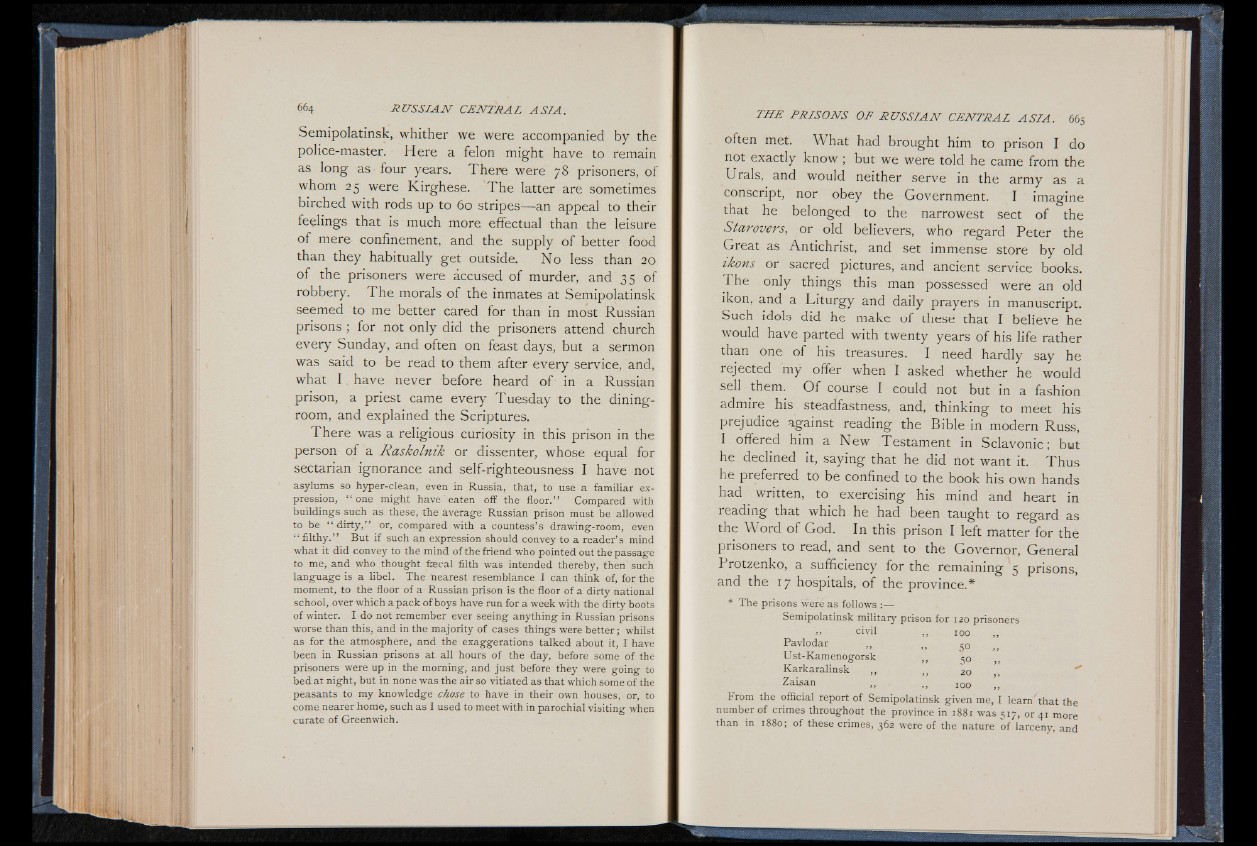
Semipolatinsk, whither we were accompanied by the
police-master. Here a felon might have to remain
as long as four years. There were 78 prisoners, of
whom 25 were Kirghese. The latter are sometimes
birched with rods up to 60 stripes— an appeal to their
feelings that is much more effectual than the leisure
of mere confinement, and the supply of better food
than they habitually get outside. No less than 20
of the prisoners were accused of murder, and 35 of
robbery. The morals of the inmates at Semipolatinsk
seemed to me better cared for than in most Russian
prisons ; for not only did the prisoners attend church
every Sunday, and often on feast days, but a sermon
was said to be read to them after every service, and,
what I have never before heard of in a Russian
prison, a priest came every Tuesday to the diningroom,
and explained the Scriptures.
There was a religious curiosity in this prison in the
person of a Raskolnik or dissenter, whose equal for
sectarian ignorance and self-righteousness I have not
asylums so hyper-clean, even in Russia, that, to use a familiar expression,
“ one might ha ve 'e aten off the floor.” Compared with
buildings such as these, the average Russian prison must be allowed
to be “ dirty,” or, compared with a countess’ s drawing-room, even
“ filthy.” But if such an expression should convey to a reader’ s mind
what it did convey to the mind of the friend who pointed out the passage
to me, and who thought faecal filth was intended thereby, then such
language is a libel. The nearest resemblance I can think of, for the
moment, to the floor of a Russian prison is the floor of a dirty national
school, over which a pack of boys have run for a w eek with the dirty boots
of winter. I do not remember ever seeing anything in Russian prisons
worse than this, and in the majority of cases things were better; whilst
as for the atmosphere, and the exaggerations talked about it, I have
been in Russian prisons at all hours of the day, before some of the
prisoners were up in the morning, and just before they were going to
bed at n ight, but in none was the air so vitiated as that which some of the
peasants to my knowledge chose to have in their own houses, or, to
come nearer home, such a s I used to meet with in parochial visiting when
curate of Greenwich.
often met. What had brought him to prison I do
not exactly know ; but we were told he came from the
Urals, and would neither serve in the army as a
conscript, nor obey the Government. I imagine
that he belonged to the narrowest sect of the
Star overs, or old believers, who regard Peter the
Great as Antichrist, and set immense store by old
ikons or sacred pictures, and ancient service books.
The only things this man possessed were an old
ikon, and a Liturgy and daily prayers in manuscript.
Such idols did he make of these that I believe he
would have parted with twenty years of his life rather
than one of his treasures. I need hardly say he
rejected my offer when I asked whether he would
sell them. O f course I could not but in a fashion
admire his steadfastness, and, thinking to meet his
prejudice against reading the Bible in modern Russ,
I offered him a New Testament in Sclavonic; but
he declined it, saying that he did not want it. Thus
he preferred to be confined to the book his own hands
had written, to exercising his mind and heart in
reading that which he had been taught to regard as
the Word of God. In this prison I left matter for the
prisoners to read, and sent to the Governor, General
Protzenko, a sufficiency for the remaining 5 prisons,
and the 17 hospitals, of the province.*
* The prisons were as follows :— \
Semipolatinsk military prison for 120 prisoners
» civil „ IOo
Pavlodar ,, >( r0
Ust-Kamenogorsk ,, c0
Karkaralinsk ,, , 2o
Z3.1s3.11 } ^ , IOO
From the official report of Semipolatinsk given me, I learn that the
number of crimes throughout the province in 1881 was 517, or 41 more
than in 1880; of these crimes, 362 were of the nature of larceny, and